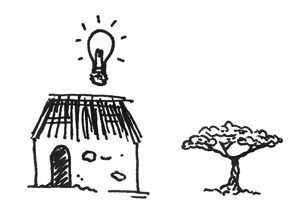 At SolarAid we have always been on a mission to make solar energy and lighting more affordable. We’ve sold almost 2 million little solar lights, we pioneered light libraries and Pay As You Go solar for people below the poverty line, and launched what was at the time, the World’s most affordable solar light.
At SolarAid we have always been on a mission to make solar energy and lighting more affordable. We’ve sold almost 2 million little solar lights, we pioneered light libraries and Pay As You Go solar for people below the poverty line, and launched what was at the time, the World’s most affordable solar light.
But despite this success, we need to do more to reach those in extreme poverty. Business as usual scenarios are projecting that, by 2030, over 600 million people across sub-Saharan Africa will still be without access to modern forms of energy. 2030 is the same year SDG7 has targeted to ‘Ensure universal access to affordable, reliable and modern energy services.’ SDG7 is, therefore, heading for failure. SolarAid is committed to changing this future reality.
So we’ve come up with a new idea which we are calling Project Switch.
Working with the community we will install cables, switches and light bulbs in households throughout Mandevu, in Malawi, village for free. We agree an affordable fee with the community for each household to rent a solar charged battery – no more than someone normally pays for candles or batteries that only last a few days. They simply connect the solar charged battery to their house. When it needs recharging, they take the battery to a solar powered charging station that we install in the village. The monthly fee from each household pays for someone to look after and run the charging station and helps creates a sustainable solution that doesn’t depend on aid.
The villagers will then be able to charge their batteries as often as they like. Sunshine is free after all!
This solution will be life changing. It will light up homes, enabling children to play and study safely. No more burns, or even worse, accidents from using candles. No one in the village will need to buy candles or paraffin anymore, helping them save money and escape from poverty.
 So people that have never been able to afford solar before will get access to a solar powered light bulb which plugs into a USB port which can be used to charge other devices. The batteries will take a few hours to charge at the central charging station, run by a local agent, and should last 3 – 5 years before they need replacing.
So people that have never been able to afford solar before will get access to a solar powered light bulb which plugs into a USB port which can be used to charge other devices. The batteries will take a few hours to charge at the central charging station, run by a local agent, and should last 3 – 5 years before they need replacing.
We’re hoping the fee will be between $1 and $2 / month – but this is the type of data we will learn more about by doing. Innovation is practical research and ongoing development. If the fee is unaffordable for some, our job will be to find ways in which we can keep people’s lights on.
Our CEO, John Keane, is going to Malawi this week to visit pilot sites, discuss practical timeline and more details with the team. If we can raise the funds the pilot project will start later this year, after which we will monitor it for 6-12 months to assess how things are working, with a view to replicating the model at further locations in Malawi and hopefully, across Africa.
Can you help?
Recognising that many people are still being left in the dark and that there is a need for new, innovative, solutions, a generous SolarAid supporter is offering to match donations, up to a £50,000 maximum, made between now and the summer solstice on 21st June. This is a wonderful opportunity to double your impact, so we can reach more people.
See the Project Switch appeal page for more details and to donate.
Thank you for your support.